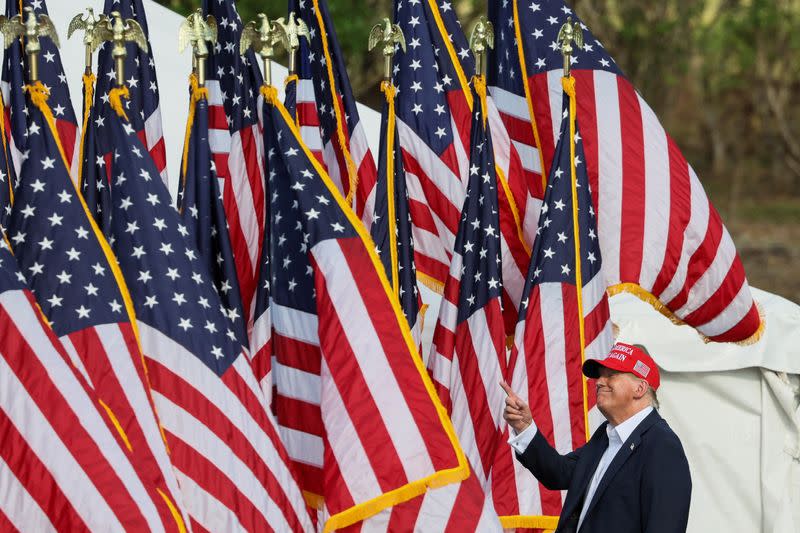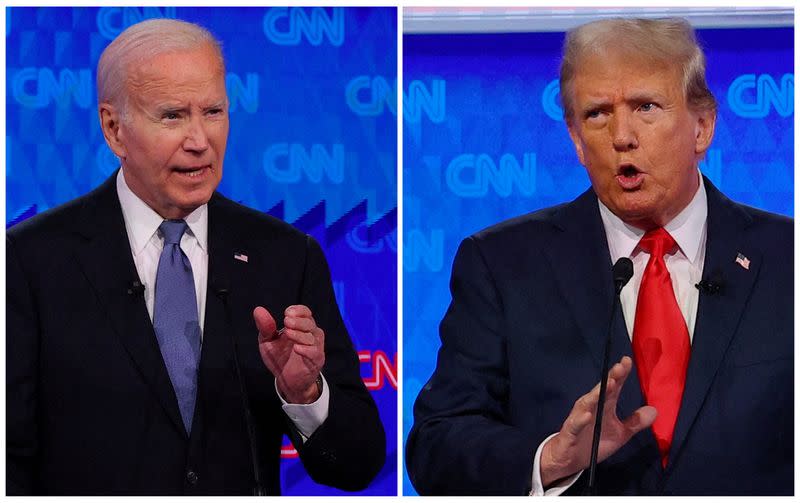US intelligence official indicates Russia prefers Trump as election victor
By Jonathan Landay and Andrew Goudsward
WASHINGTON (Reuters) -The U.S. has not seen Russia shift on its preference from previous U.S. presidential elections on who it prefers to win this year, a U.S. intelligence official said on Tuesday, indicating that Moscow again favors Republican Donald Trump.
The official, briefing reporters on U.S. election security, did not name the former president and presumptive Republican nominee when asked who Moscow wants as the next U.S. president.
But he indicated that Russia favored Trump, saying the U.S. intelligence community had not changed its assessments from previous elections.
Those assessments had found that Moscow tried through influence campaigns to help Trump win in 2016 against Hillary Clinton and in 2020 against President Joe Biden.
"We have not observed a shift in Russia's preferences for the presidential race from past elections, given the role the U.S. is playing with regard to Ukraine and broader policy toward Russia," said the official from the Office of the Director of National Intelligence (ODNI).
The Russian embassy did not immediately respond to requests for comment.
The Trump campaign responded by saying Biden was weak on Russia, as evidenced by the Russian invasion of Ukraine.
"When President Trump was in the Oval Office, Russia and all of America's adversaries were deterred, because they feared how the United States would respond," Karoline Leavitt, the Trump campaign's press secretary, said in a statement.
Trump frequently has criticized the scale of U.S. military support for Ukraine - some $60 billion since Russia's full-scale invasion in 2022 - and called Ukrainian President Volodymyr Zelenskiy "the greatest salesman ever."
Two of Trump's national security advisers have presented him with a plan to end U.S. military aid to Ukraine unless it opened talks with Russia to end the conflict.
On policy toward NATO, Trump has said he would "encourage" Russia to do "whatever the hell they want" to any alliance member that did not spend enough on defense and he would not defend them.
The NATO charter obliges members to come to the defense of members that are attacked.
The ODNI official conducted the briefing on condition of anonymity with ODNI colleagues and officials from the FBI and the National Coordinator for Critical Infrastructure Security and Resilience, an agency that conducts cyber defense for the government and works with private industry.
He defined election influence as efforts to shape the outcome of polls or undermine democratic processes, while interference constitutes efforts to disrupt the ability of the U.S. to hold a free and fair vote.
The U.S. has not monitored plans by any country to "degrade or disrupt" the country's ability to hold the November elections, he said.
But Russia, he continued, through social media and other means has begun trying to influence specific groups of U.S. voters in battleground states, "promote divisive narratives and denigrate specific politicians," whom he did not identify.
"Russia is undertaking a whole of government approach to influence the election, including the presidential, Congress, and public opinion," he said.
Moscow "determines which candidates they're willing to support or oppose largely based on their stance toward further U.S. aid to Ukraine and related issues," said the official. "It's all the tactics we've seen before, primarily through social media efforts" and "using U.S. voices to amplify their narratives."
A new intelligence community assessment published this week on the ODNI website said Russia "remains the primary threat to our elections" and that unidentified "Russian influence actors" secretly plan to "sway public opinion" in swing states and "diminish U.S. support for Ukraine."
Russia recently has been seeking to influence U.S. audiences through "encrypted direct messaging channels," said the official. He did not elaborate.
China is assessed as currently not planning "to influence the outcome of the presidential race," the official said.
The U.S. views China as its leading geostrategic rival. Beijing and Washington have been working to ease strains. The Chinese embassy did not immediately respond to a request for comment.
Beijing is trying to expand its ability to collect and monitor data from social media platforms "probably to better understand and eventually manipulate public opinion," the official said.
The official called generative artificial intelligence a "malign influence accelerant" being increasingly used to "more convincingly tailor" video and other content ahead of the November vote.
(Reporting by Jonathan Landay and Andrew Goudsward; Editing by Leslie Adler and David Gregorio)

 Yahoo News
Yahoo News 

